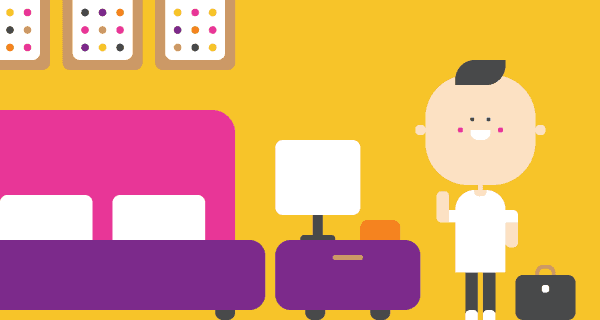Answers about travel insurance, refunds, safety tips, and more from Lola.com’s team of travel experts
In the last couple of months, Coronavirus (now called COVID-19) has gone from localized outbreak to full-fledged global health emergency. In doing so, it has taken a serious toll on healthcare providers, the stock market and, especially, travel. Indeed, the last few weeks have seen the global travel industry spin into a state of confusion, complicated questions, and outright panic. Thousands and thousands of travelers have cut back on discretionary travel as they try to weigh the relative risks.
But what about business travel? How have companies and corporate travelers approached trips that are seen as essential to their work? What about large industry conferences? How are airlines and hotels working with companies to mitigate the impact of postponed, altered or outright cancelled business travel?
We know this issue is important and urgent for corporate travelers (and we’ve been getting a ton of questions from our customers), so we sat down with our award-winning team of travel experts (the Wombats) to answer the most pressing questions about COVID-19 and business travel.
Does travel insurance cover COVID-19?
It depends, but not typically. Travel insurance policy terms vary dramatically, so the answer really depends on the fine print of the specific policy you purchase, but here are the broad strokes:
Any travel arrangements made since the broad news coverage of the virus started (approx. end of January 2020) would likely not be covered as the outbreak of Coronavirus is now considered a “foreseen event” and travel booked during this time would have been made with the knowledge of current world events.
However, some types of travel insurance are more inclusive. Purchasing “cancel for any reason” or “change of mind” coverage upgrades are the best way to maximize the likelihood of being covered. Otherwise the policy fine print should outline what the provider covers in cases of public health emergency.
Can I get a refund from airlines and hotels for trips cancelled due to COVID-19 concerns?
Airlines are starting to be more flexible and generous with their refund policies, but there is no blanket policy about refunds, outside of airlines implementing new policies (fleshed out in the next question) and normal refund policies.
If an airline cancels a flight you can always receive a refund. If a hotel can not accommodate you a refund is also due. If you are attending a conference or meeting that gets canceled over Coronavirus concerns the refundability of your hotel and flight reservations would be up to the discretion of the provider.
Some airlines are being more proactive about the types of refundability they offer, which we get into in the next question.
How are different airlines approaching the impact of COVID-19?
Right now all major airlines that travel to/from Asia and Italy have waivers in place for passengers to make changes to their travel dates or cancel travel entirely without being subjected to airline fees.
For domestic travel within the United States, JetBlue is offering their travelers waived fees/cancellations on bookings made 2/27-3/11 with their “Travel With Confidence ” offer good for travel through June 1st, 2020. American Airlines announced on Sunday that they too will waive change and cancelation fees on flights bought through March 16th. This policy covers tickets purchased for travel through January 2021. As there are no active travel warnings for the US, other airlines have not yet followed suit with domestic flight change waivers. The waivers and cancellation offers change often and as a rule anyone looking to adjust or cancel their travel should refer to the airline specific policy for updated travel destinations, travel dates, and terms.
For more global policies and granular information about airport / lounge closings, you can check out this detailed article from Business Traveller.
How are different hotels approaching the impact of COVID-19?
For the most part, rate rules still apply to hotel cancellations and refunds. Some hotels are being more flexible with their refunds (especially in light of major conference or expo cancellations), but this is up to individual hotels.
Some hotels that have been impacted by the Coronavirus have taken safeguard measures of shutting down completely, or confining guests if there has been a known positive case. Such measures have been taken in places like Tenerife, a Spanish resort destination in the Canary Islands.
Where can I get the most up-to-date information about travel restrictions and guidance?
https://www.cdc.gov/coronavirus/2019-ncov/index.html
Is there a list of the most affected countries / regions?
As of right now China, Iran, South Korea, Italy, and Japan are the top 5 affected, but the list is constantly evolving. The World Health Organization does a good job of releasing regular updates about the global picture, the State Department maintains an updated travel advisory listing, and Johns Hopkins University offers a nearly real-time map of confirmed cases by country.
What are airlines doing to help travelers?
Many airlines have implemented new measures to reduce the risk of the infection spreading in-flight, including more frequent disinfection of the aircrafts and lounges, advising the crew to wear masks, reducing in-flight services to avoid unnecessary contact, and conducting temperature checks before passengers board the plane.
What are hotels doing to help travelers?
At this time hotels are following their standard room cleaning protocol as well as providing hand sanitizing stations.
Should I cancel all domestic business trips?
At this time there is no CDC issued travel health notice for domestic travel, so it’s really an individual business decision. However, as with any cold and flu season, for anyone with preexisting health conditions, it’s important to work with a healthcare provider to understand if they are in a high risk category for illness.
Rescheduling is reasonable, and/or adapting to meet remotely. Don’t forget about the tools most companies already use daily. Many work remotely at least part of the time, or self-quarantine when we are sick because of the ease of technology in doing our daily work. This can be an appropriate time to apply those rules and host remote meetings.
What are the most effective ways to reduce infection risk while I’m traveling?
- WASH YOUR HANDS! For a full 20 seconds (sing “Happy Birthday” 2x in your head…or out loud, you do you!), with warm water and soap.
- Avoid physical / close contact with sick individuals. If you notice someone coughing or sneezing, move away from them.
- Get the flu vaccine before you leave. (This won’t necessarily help protect against COVID-19 itself but helps save medical resources and generally improve against weakened-immune ailments like bacterial pneumonia.) Do keep in mind that the full immunity effects of the vaccine take up to 2 weeks and should not be relied upon as an immediate safeguard.
- Sanitize all surfaces, like the tray table, arm rests and any common surfaces on the plane. This includes items like magazines and touch screen TVs and remotes.
- Stock up on flu medication and bring it with you. If you do get sick, the last thing you want to have to do is track down a pharmacy to buy meds in an unfamiliar city.
- Face masks, of the common surgical variety, will not offer protection against airborne virus, however, wearing such a mask if you do get sick, can protect those around you.
What can I do at conferences to reduce the risk of infection for myself and others?
- Avoid handshaking (tough to do on a business trip!). Try an “elbow bump” instead.
- Keep a distance of 6ft or more from anyone actively coughing or sneezing
- Wash your hands regularly
- Avoid touching your face
- Be kind and cover a cough or sneeze by doing so into your elbow and not your hands
- Drink a lot of water
- Keep hand sanitizer in your bag or briefcase.
- Stay home if you start to experience flu symptoms (fever, cough, sneezing, achiness, etc).
- Prioritize a good night’s sleep over going out with coworkers or sneaking in that extra hour of meeting prep.



